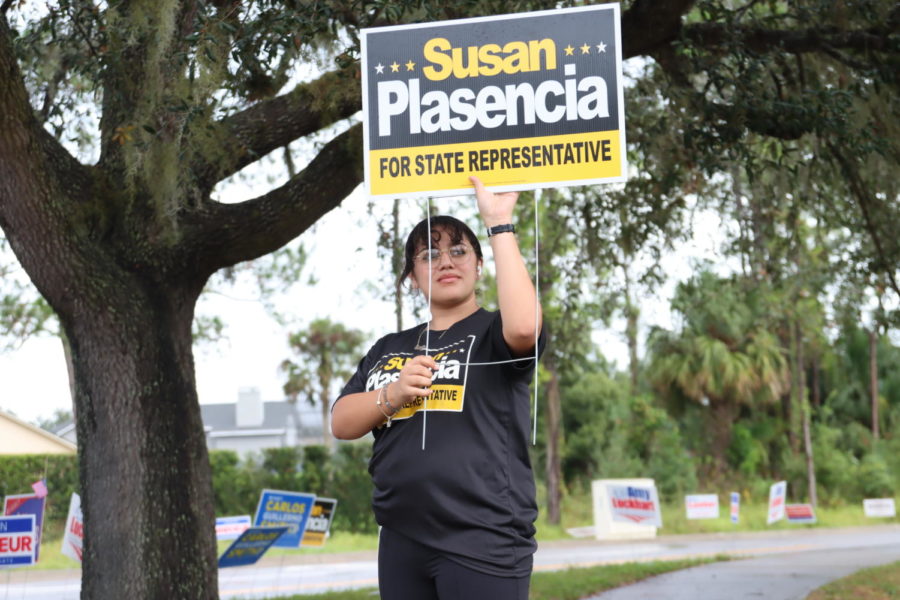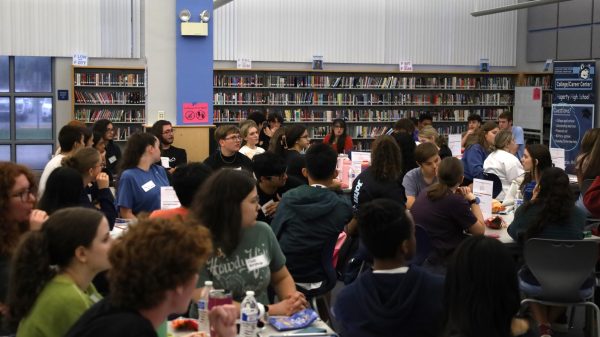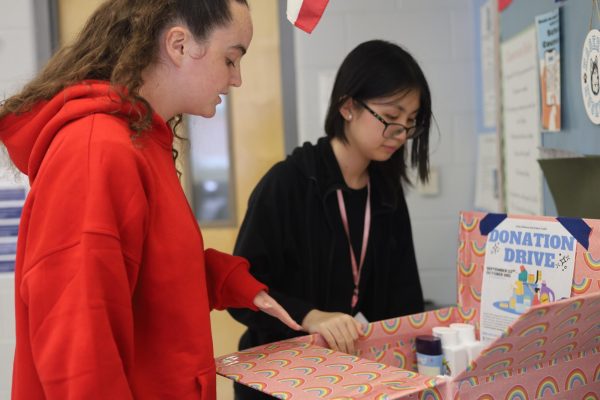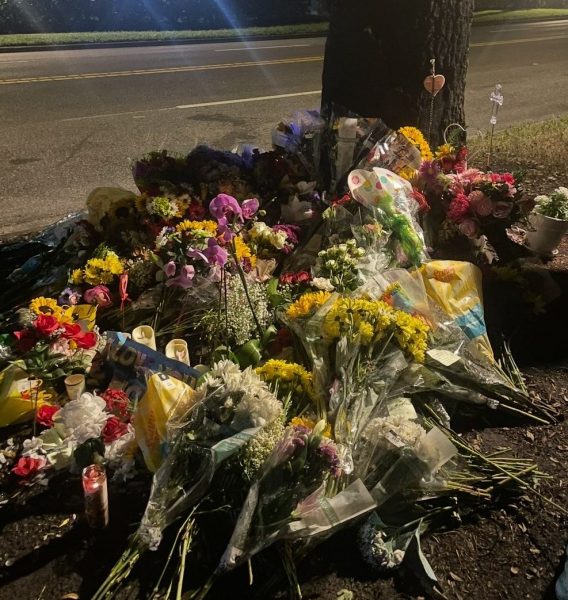Florida Republicans maintain power, but expected ‘red wave’ falls short
photo by Sarah Hinnant
A grassroots worker for state representative Susan Placensia stands outside the Oviedo Presbyterian Church. The church served as a polling place and campaign grounds for the Florida midterms.
For most students, bubbling in responses only comes with standardized tests and exams, but for those over 18, a simple answer sheet could uphold democracy and change.
“I found it important to go vote for these [midterm] elections because they can allow the citizens of Florida to voice their opinions,” senior Veronica Yanes-Nadal said. “As a young Hispanic woman, I feel it is my duty to voice what I feel is right.”
On Nov. 8, the midterm elections closed across the United States. Electing state governors, senators and representatives, the midterm elections serve to determine the majority control of Congress, which according to CBS, CNBC and The Washington Post, is still up for debate. While the final results of the midterms may not be determined until December, as Georgia will require a Senate runoff election, experts project that Republicans will likely take control of the House, but not by as large of a margin as was expected.
Historically, there is a trend in midterm elections where the current president’s party experiences a major loss of congressional seats, but this year, that projection did not occur. Experts suggest this was due to upset from the overturning of Roe v. Wade in June and aggressive outreach to young voters through social media campaigns, which allowed the Democratic party to lessen the “red wave.” Despite the Democratic party losing eight of their seats, leaving them at 203, the GOP will still need to gain an additional six in the final results, as they currently stand at 212, with 218 seats required for majority control. Unlike the House, the U.S. Senate will remain in Democratic control with 50 representatives in the Democratic party and 49 in the GOP, which may be subject to change with new results.
In Florida, Gov. Ron DeSantis was re-elected with a 59.4% majority vote, beating his Democratic opponent Charlie Crist. Likewise in the Senate, Republican senator Marco Rubio beat Democratic nominee Val Demmings with 57.7% of the vote. Although the percentage of Democratic votes in Florida increased, the previously labeled swing state continues to have a Republican majority.
“Honestly, I was not surprised [by the results],” senior Braden Bast said. “This is Florida; Republicans seem to win every year and the demographic of our state supports it.”
Political demographics can be seen not only in poll maps, but on campus. In a poll out of 149 students on campus, 39% said they mostly align with the Republican party. The other 42% said they would consider themselves Democrats, and 19% chose neither. Although only 19% of students said they were able to vote in this year’s midterm elections, many still believe that being active and educated on political issues is important to the campus environment.
“You can still make your voice be heard even if you aren’t eligible to vote by voicing information on social media,” junior Haylee Citty said. “It is super important because the future of our generation rests on the decisions of congress, and as young adults growing into such a divided world, we need to act even if we cannot vote yet.”
By sharing news and information on social media, students could raise awareness for issues important to them. As Roe v. Wade was overturned by the Supreme Court in June, allowing state leaders to limit abortion access, women’s autonomy became a crucial issue in this year’s midterm elections. On top of abortion rights, threats to LGBTQ+ education and inflation were also key topics in the polls.
“I believe that rights, in general, are at stake,” Bast said. “Women’s rights, LGBTQ rights, just rights, in general, are being threatened by those in charge of our state.”
While many students and voters were concerned by these topics, only about 85% of the 17,002,480 eligible voters in Florida are actually registered, and only 46% went to the polls.
“A big [problem] is that a majority of people didn’t vote,” junior Camden Ward said. “It seems to be the people that didn’t vote that turn around and complain or question who is in the White House or Congress.”
Along with a lack of turnout among voters, a lack of education among youth also contributes to the campus environment. Through social media disputes and blind opinions, students can often get misled or misinformed about political issues and results.
“In previous years, I have posted about an election result and every once in a while, I will get responses from people belittling me for what I posted,” Bast said. “Every time this has happened, they have had no evidence or case to anything they have said.”
In order for future voting turnout to increase, many believe political awareness and education need to start as soon as possible. The more students learn about political and social issues, the better prepared they will be to form and voice their own opinions.
“I don’t believe any high school students are fully aware of all the circumstances in which these elections can fully affect our lives,” Yanes-Nadal said.
Your donation will support the student journalists of Hagerty High School. We are an ad-free publication, and your contribution helps us publish six issues of the BluePrint and cover our annual website hosting costs. Thank you so much!







